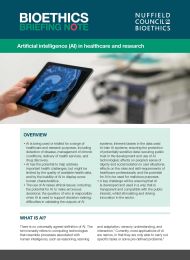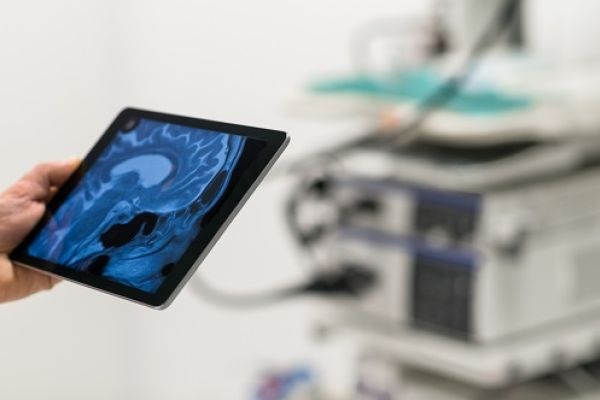Artificial intelligence (AI) in healthcare and research
Policy Briefing
Published 15/05/2018

Recent interest in AI
AI is not new, but there have been rapid advances in the field in recent years. This has in part been enabled by developments in computing power and the huge volumes of digital data that are now generated. A wide range of applications of AI are now being explored with considerable public and private investment and interest. The UK Government announced its ambition to make the UK a world leader in AI and data technologies in its 2017 Industrial Strategy. In April 2018, a £1bn AI sector deal between UK Government and industry was announced, including £300 million towards AI research.
AI is lauded as having the potential to help address important health challenges, such as meeting the care needs of an ageing population. Major technology companies – including Google, Microsoft, and IBM – are investing in the development of AI for healthcare and research. The number of AI start-up companies has also been steadily increasing. There are several UK-based companies, some of which have been set up in collaboration with UK universities and hospitals. Partnerships have been formed between NHS providers and AI developers such as IBM, DeepMind, Babylon Health, and Ultromics.
Such partnerships have attracted controversy, and wider concerns about AI have been the focus of several inquiries and initiatives within industry, and medical and policy communities (see below).
Examples of inquiries and initiatives on AI
- UK Government Centre for Data Ethics and Innovation – announced in January 2018 to advise on safe, ethical, and innovative uses of data-driven technologies.
- Ada Lovelace Institute – the Nuffield Foundation announced it will set up the Institute by the end of 2018 to examine ethical and social issues arising from the use of data, algorithms, and AI, ensuring they are harnessed for social well-being.
- Partnership on AI – a platform for discussion and engagement around AI founded by Amazon, Apple, DeepMind, Facebook, Google, IBM, and Microsoft.
- IEEE – launched a Global Initiative on Ethics of Autonomous and Intelligent Systems in 2016.
- United Nations Interregional Crime and Justice Research Institute – set up a programme on Artificial Intelligence and Robotics in 2015.
- Asilomar AI Principles – developed in 2017 by the Future of Life Institute (US) to guide AI research and application, and signed by over 3,800 researchers and others working in AI and robotics around the world.
- Reports on AI have been published by the House of Lords Select Committee on Artificial Intelligence, the Royal Society, Reform, Future Advocacy and Wellcome, Nesta, and the European Group on Ethics in Science and New Technologies. A further report is expected from the House of Commons Science and Technology Select Committee.

Share